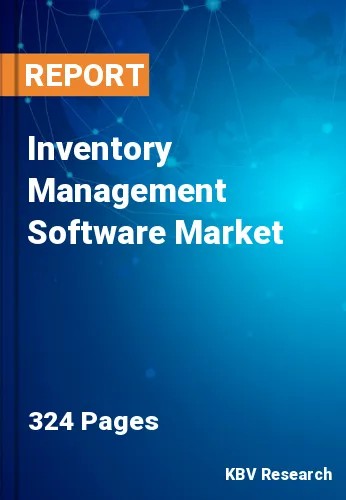The Global Inventory Management Software Market size is expected to reach $4.7 billion by 2030, rising at a market growth of 11.2% CAGR during the forecast period.
Integrating scanning and barcoding technology significantly elevates the accuracy of inventory tracking within IMS. Consequently, the scanning and barcoding segment captured $226.9 revenue in the market in 2022. Each product is assigned a unique barcode, and with handheld scanners or mobile devices, businesses can effortlessly capture and record real-time data on product movement, location, and status. This heightened accuracy minimizes errors associated with manual data entry, leading to a more precise and reliable inventory management process. Instead of manually inputting information prone to errors and time-consuming, staff can use barcode scanners to swiftly capture data.
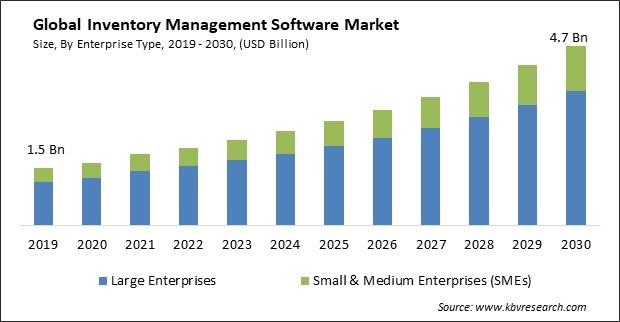
The major strategies followed by the market participants are Mergers & Acquisition as the key developmental strategy to keep pace with the changing demands of end users. For instance, In October, 2023, IBM Corporation announced the acquisition of Manta Software Inc. to enhance product capabilities and support businesses in delivering trustworthy and transparent products. Manta's data lineage features increased transparency in WatsonX, allowing businesses to assess data usage in AI models, understand its origin and evolution, and detect discrepancies in data flows. Additionally, In September, 2022, Fishbowl Inventory acquired Red Salt, its exclusive distribution partner in Australia, New Zealand, and Singapore, operating as Fishbowl Australia. The addition of Red Salt allowed Fishbowl to closely coordinate efforts, better serving customers in that region and expanding its market-leading position.
Based on the Analysis presented in the KBV Cardinal matrix; Oracle Corporation is the forerunner in the Market. For Instance, In November, 2023, Oracle Corporation added new mobile capabilities to Oracle Fusion Cloud Inventory Management. These features benefited healthcare organizations by reducing inventory errors, enhancing restock efficiency, and providing visibility for better demand prediction and stock optimization. Companies such as IBM Corporation, Lightspeed Commerce Inc., Intuit, Inc. are some of the key innovators in Inventory Management Software Market.
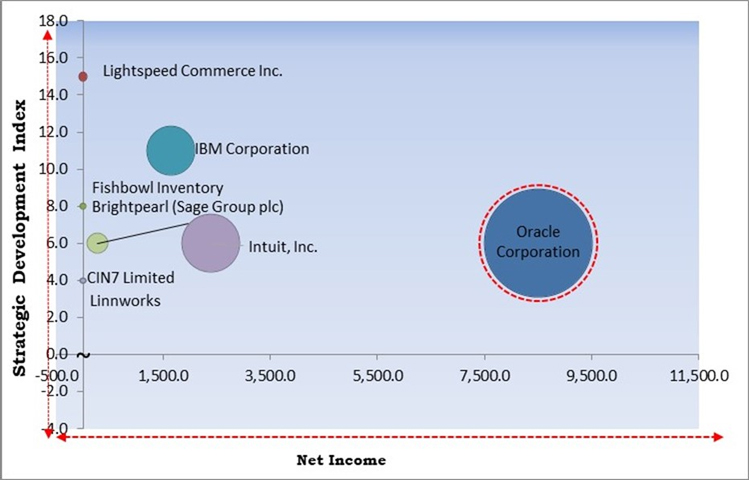
Efficient order processing is a cornerstone of e-commerce success. IMS automates order processing workflows, minimizes manual errors, and streamlines the entire order fulfillment cycle. From order entry to shipping and delivery, IMS ensures that e-commerce businesses can fulfill customer orders accurately and promptly, contributing to customer satisfaction and retention. E-commerce platforms often operate across multiple channels, including online marketplaces, social media, and direct sales. IMS seamlessly integrates with these diverse channels, providing a centralized platform for managing inventory across the entire e-commerce ecosystem. This integration prevents overselling or underselling, reduces data discrepancies, and fosters a unified approach to inventory management. The market is expanding significantly due to the exponential growth of e-commerce platform.
The shift towards cloud computing has significantly impacted the IMS. Cloud-based inventory management software offers scalability, flexibility, and accessibility. Businesses can leverage cloud solutions to store and retrieve inventory data from anywhere, facilitating remote access and collaboration. This scalability ensures that IMS grows in tandem with the evolving needs of businesses. IMS, equipped with advanced analytics and reporting tools, empowers businesses to extract actionable insights from their inventory data. The ability to generate customized reports, analyze key performance indicators, and visualize trends enables informed decision-making. These analytics tools contribute to strategic planning, cost optimization, and operational excellence. As a result of the increasing advancements in technology, the market is anticipated to increase significantly.
Configuring IMS to suit a business's specific needs and processes can be complex. Customization often requires technical expertise, and businesses may find it challenging to configure the software to align perfectly with their unique workflows. Complexity in configuring IMS often translates to higher implementation costs. Complex configurations may lead to a steeper learning curve for users. Employees may resist adopting the new system due to difficulty understanding and navigating the customized features. Incompatibility can create data silos, reducing the effectiveness of integrated inventory management across the entire business. Highly complex configurations may limit the ability of businesses to customize the IMS to suit evolving needs. Lack of flexibility in customization can be a significant drawback, especially in industries with rapidly changing requirements. Thus, complexity of configuration in IMS can slow down the growth of the market.
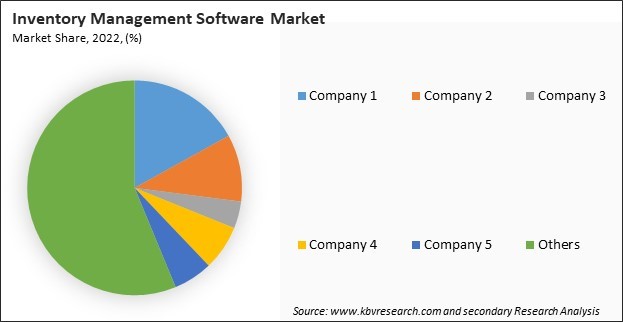
The leading players in the market are competing with diverse innovative offerings to remain competitive in the market. The above illustration shows the percentage of revenue shared by some of the leading companies in the market. The leading players of the market are adopting various strategies in order to cater demand coming from the different industries. The key developmental strategies in the market are Mergers & Acquisition.
On the basis of enterprise type, the market is divided into large enterprises and small & medium enterprises (SMEs). The small & medium enterprises (SMEs) segment garnered a significant revenue share in the market in 2022. As e-commerce continues to grow, SMEs are increasingly embracing online sales channels. This integration enhances consistency in inventory data, prevents overselling or underselling, and facilitates a unified approach to inventory management across various sales channels. IMS provides scalability, allowing SMEs to scale their operations up or down based on demand. This flexibility is particularly beneficial for SMEs as it ensures they can align their inventory management processes with the evolving needs of their business without overcommitting resources.
By deployment, the market is categorized into on-premises and cloud. In 2022, the on-premises segment held the highest revenue share in the market. On-premises IMS solutions offer a high degree of customization to align with a business's specific needs and workflows. The ability to customize features, reports, and integrations ensures that the IMS seamlessly integrates with existing systems and processes, enhancing overall operational efficiency. One of the primary drivers behind the uplift of the on-premises segment is the heightened emphasis on data security and control. On-premises solutions allow organizations to manage and secure their data within their infrastructure, reducing the risk of unauthorized access and ensuring compliance with regulatory standards.
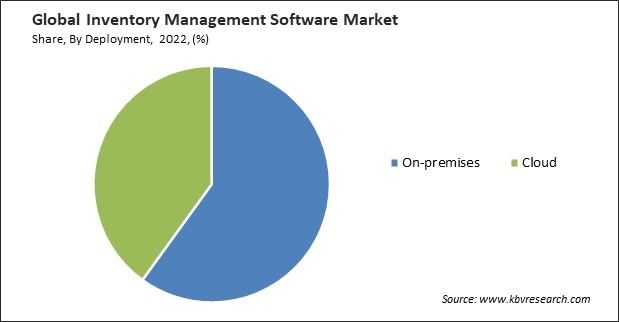
By end-use, the market is segmented into manufacturing, retail & consumer goods, healthcare, energy & utilities, automotive, and others. In 2022, the retail & consumer goods segment recorded a remarkable revenue share in the market. IMS offers robust SKU (Stock Keeping Unit) management capabilities, enabling businesses to handle diverse product portfolios efficiently. IMS facilitates seamless integration across these channels, allowing retailers to synchronize real-time inventory data. This omnichannel capability ensures product availability, pricing, and order fulfilment consistency, providing customers with a unified and positive shopping experience.
Based on application, the market is classified into inventory control & tracking, order management, scanning & barcoding, asset management, and others. In 2022, the inventory control & tracking segment witnessed the largest revenue share in the market. Inventory management software has evolved to incorporate advanced analytics and machine learning algorithms, enabling businesses to move beyond reactive inventory management to proactive demand forecasting. Expanding control and tracking functionalities allows organizations to analyze historical data, identify patterns, and accurately predict future demand. This foresight aids in optimizing inventory levels, minimizing carrying costs, and ensuring product availability.
| Report Attribute | Details |
|---|---|
| Market size value in 2022 | USD 2 Billion |
| Market size forecast in 2030 | USD 4.7 Billion |
| Base Year | 2022 |
| Historical Period | 2019 to 2021 |
| Forecast Period | 2023 to 2030 |
| Revenue Growth Rate | CAGR of 11.2% from 2023 to 2030 |
| Number of Pages | 324 |
| Number of Table | 473 |
| Report coverage | Market Trends, Revenue Estimation and Forecast, Segmentation Analysis, Regional and Country Breakdown, Competitive Landscape, Market Share Analysis, Porter’s 5 Forces Analysis, Company Profiling, Companies Strategic Developments, SWOT Analysis, Winning Imperatives |
| Segments covered | Enterprise Type, Deployment, Application, End-use, Region |
| Country scope |
|
| Companies Included | Zoho Corporation Pvt. Ltd., IBM Corporation, Oracle Corporation, Lightspeed Commerce Inc., CIN7 Limited, Linnworks, Intuit Inc., Acumatica, Inc., Fishbowl Inventory and Brightpearl (Sage Group plc) |
| Growth Drivers |
|
| Restraints |
|
Region-wise, the market is analysed across North America, Europe, Asia Pacific, and LAMEA. In 2022, the North America region led the market by generating the highest revenue share. The North American region is at the forefront of technological advancements, and businesses quickly adopt innovative solutions that can drive growth. With its integration of technologies such as barcode scanning, RFID, and cloud computing, IMS aligns with the technological landscape of North American businesses.
Free Valuable Insights: Global Inventory Management Software Market size to reach USD 4.7 Billion by 2030
The market research report covers the analysis of key stake holders of the market. Key companies profiled in the report include Zoho Corporation Pvt. Ltd., IBM Corporation, Oracle Corporation, Lightspeed Commerce Inc., CIN7 Limited, Linnworks, Intuit Inc., Acumatica, Inc., Fishbowl Inventory and Brightpearl (Sage Group plc).
By Enterprise Type
By Deployment
By End-use
By Application
By Geography
This Market size is expected to reach $4.7 billion by 2030.
Exponential growth of e-commerce platforms are driving the Market in coming years, however, Complexity of configuration in IMS restraints the growth of the Market.
Zoho Corporation Pvt. Ltd., IBM Corporation, Oracle Corporation, Lightspeed Commerce Inc., CIN7 Limited, Linnworks, Intuit Inc., Acumatica, Inc., Fishbowl Inventory and Brightpearl (Sage Group plc).
The expected CAGR of this Market is 11.2% from 2023 to 2030.
The Large Enterprises segment is leading the Market by Enterprise Type in 2022; thereby, achieving a market value of $3.5 billion by 2030.
The North America market dominated the Market by Region in 2022 and would continue to be a dominant market till 2030; thereby, achieving a market value of $1,614.2 million by 2030.
Our team of dedicated experts can provide you with attractive expansion opportunities for your business.
